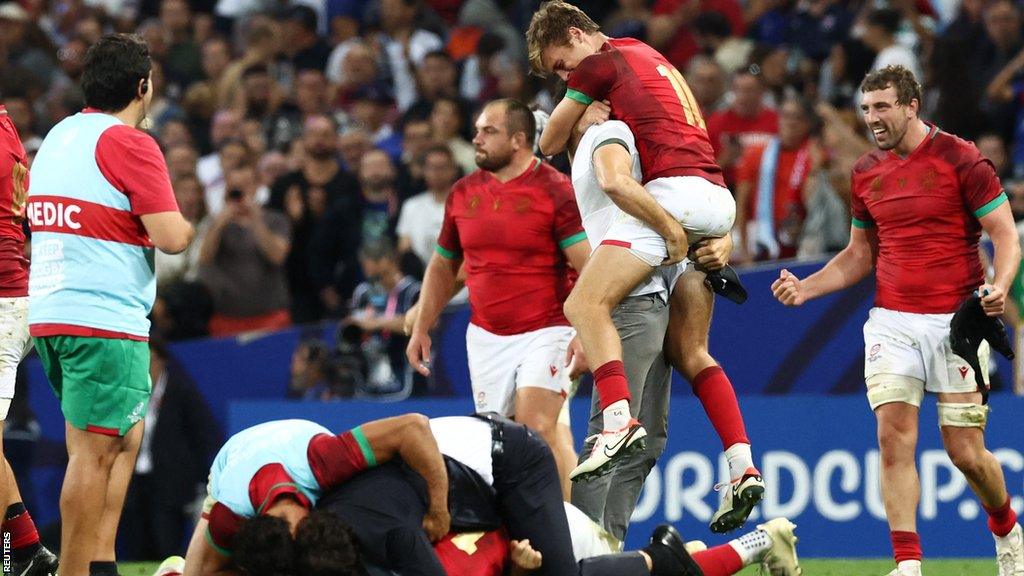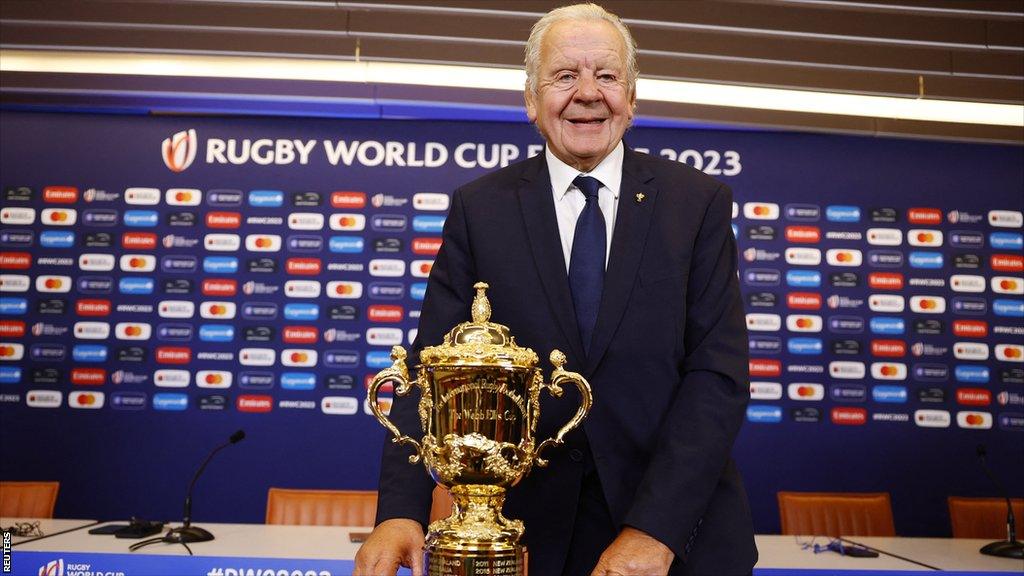Rugby World Cup 2023: Sir Bill Beaumont promises 'greater opportunity' for tier-two nations
- Published
- comments

Portugal impressed with their attacking style during the Rugby World Cup, culminating in victory over Fiji on Sunday
World Rugby "must and will do everything" to give "greater certainty and opportunity" to tier-two nations, chairman Sir Bill Beaumont has said.
Fiji are the only team from outside tier one to reach the quarter-finals of the Rugby World Cup in France.
Discussions about a new global calendar are ongoing, which emerging nations hope will offer more competitive games.
Beaumont said tier-two nations are "central to our discussions on a reimagined international calendar".
What is the difference between tier one and tier two?
Tier one consists of the European teams who play in the Six Nations (England, Scotland, Wales, Ireland, France and Italy), and the four who compete in the southern hemisphere's Rugby Championship (Australia, New Zealand, South Africa and Argentina).
Every other nation that plays at the World Cup, but does not feature in those top-level annual tournaments, is from tier two.
Tier-two nations have had differing fortunes in France; Portugal achieved the first Rugby World Cup win in their history against Fiji on Sunday, while others such as Japan, Samoa and Uruguay put in creditable performances against higher-ranked opposition.
However, Romania conceded more than 70 points in three successive Pool B defeats, Namibia were heavily beaten on three occasions in Pool A and debutants Chile allowed more than 40 points in each of their four Pool D losses.
Fiji, helped by an upset win of their own over Australia, booked a quarter-final against England despite narrow defeats by Wales and Portugal.

Sir Bill Beaumont was first elected as chairman of World Rugby in 2016
Former England captain Beaumont said: "At this stage of the competition, we say goodbye to 12 teams.
"I want to assure everyone that the likes of Portugal, Samoa, Tonga, Uruguay, Chile and Georgia may be gone, but they are certainly not forgotten.
"We must, and will, do everything we can to provide greater certainty and opportunity of regular high-level competition for these teams.
"They are central to our discussions on a reimagined international calendar that will benefit the many, not the few.
"This, in turn, will enable us to arrive at Rugby World Cup 2031 in USA anticipating a genuinely competitive and unpredictable Rugby World Cup which is great for fans, broadcasters and commercial partners."
At the Rugby World Cup's weekly media conference on Tuesday, tournament director Michel Poussau said: "I would like to pay particular tribute to the performance unions, in particular Portugal, who achieved a historic first ever victory on Sunday against quarter-finalists Fiji.
"Fiji have reached the last eight for the first time in 16 years, but all have made their mark, despite preparation challenges, including Covid.
"We must, and will, provide them with greater certainty and opportunity to improve on the world stage, and you will hear more from World Rugby on this matter later in the tournament.
"I am sure that we will see great things from them at Rugby World Cup 2027 and beyond."
Poussau added that a total of 1.84 million fans attended the 40 pool matches, 8% higher than the 2019 tournament in Japan, while a cumulative audience of 164 million people have watched the event on television in France.
Meanwhile, the match officials for the four World Cup quarter-finals have been appointed, with England's Wayne Barnes taking charge of Ireland's game against New Zealand.
Ben O'Keeffe (New Zealand) will referee France's last-eight tie against South Africa, while England v Fiji and Wales v Argentina will be officiated by Mathieu Raynal (France) and Jaco Peyper (South Africa) respectively.